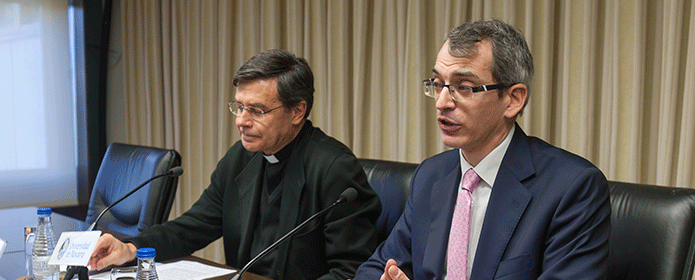An expert reminds School at Canon Law that the first parliament in the world was held in Spain, at the Cortes de León in 1188.
Alejandro González-Varas, professor of State Ecclesiastical Law, gave an academic session on the occasion of the feast of St. Raymond of Peñafort.

"The Cortes of León in 1188, held in the cloister of the Basilica of San Isidoro, constituted the first parliament assembled in the world. A fact that did not occur in another country until 1226, with the Cortes of England". This was stated at the University of Navarra by Professor Alejandro González-Varas, Professor of State Ecclesiastical Law at the University of Zaragoza, on the occasion of his participation in the celebration of the feast of St. Raymond of Peñafort, patron saint of the School of Canon Law.
González-Varas focused his exhibition on "The majority principle in the Canon Law. Historical approach and its influence in the civil sphere" and emphasized that the majority principle is a legal principle, by which the employment of majorities is necessary in decision making. It is one of the most transcendent for both the Canon Law and civil systems: "What is not always taken into account is that this criterion has a clear canonical origin. Raymond of Peñafort, the saint patron saint whose feast day we celebrate today, had an important role in its consolidation".
Impact of the canonical majority principle on civil systemsIn his message he highlighted some aspects of the transcendence of this principle in historical and current civil orders: "The first, because one cannot speak of the majority principle without the prior existence of a juridical person, an essential concept for the history of the Church and of the States. The second is that the majority principle is closely related to the theory of committee and consent, that is, in certain cases, in order to guarantee the validity of a decision, it was necessary for the person who had to decide to previously seek the committee or the consent of other persons and bodies. And the third, recalls that together with the theory of committee appears the principle quod omnes tangit ab omnibus approbari debet, what affects all must be C by all".
"Could there have been Courts without the canonical majority principle? Probably yes, but they would have arisen later and not with such great precision at the time of call, as happened under the influence of Canon Law", he said.
In addition, he recalled that the influence of the Canon Law does not end here, but that the internal functioning of the Cortes tried to emulate the internal functioning of the councils. González-Varas also emphasized that there was a great influence on the representativeness of the procurators so that they could vote: "They were granted the letters of procuration and the binding of people in a way plenary session of the Executive Council", he said.




